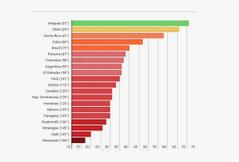 A ranking is a classification that orders elements according to a certain evaluation criterion . It is an English word that the Royal Spanish Academy ( RAE ) includes in its dictionary .
A ranking is a classification that orders elements according to a certain evaluation criterion . It is an English word that the Royal Spanish Academy ( RAE ) includes in its dictionary .
The existence of a ranking implies an ordering by positions . That which is in first place in the ranking has a value that is higher than that of the second; the second in the ranking, in turn, has a higher value than the third, and so on.
Generally, positioning is expressed through ordinal numbers . This is how a leaderboard is developed, where 1 is equivalent to the highest position.
Rankings are frequent in the field of sports . One of the best-known rankings is the one prepared by the Association of Professional Tennis Players ( ATP ) and orders the players who compete on the circuit according to their sporting achievements.
All ATP tennis players, when playing, add points, in amounts that depend on the results and the importance of the tournaments. The more games and tournaments they win, the more points they earn. The accumulated score , in turn, must be "defended" by the athlete with new victories.
The ordering of tennis players according to score is known as the ATP Rankings , which is updated every week. The Swiss Roger Federer is the tennis player who has led this ranking for the most weeks throughout history .
In the music industry, it is common for rankings to be made based on album sales or people's votes. The Billboard Hot 100 ranking , for example , lists the hundred most sold and downloaded singles in the US market.
 All this tells us that the ranking must take into account one or more parameters to order the elements in the list, and these are relatively arbitrary, since they are chosen by whoever designs it. For example: we can create a ranking of the best popular music albums using their sales as parameters, while another person could base it on the originality of the songs or their variety, among many other possibilities.
All this tells us that the ranking must take into account one or more parameters to order the elements in the list, and these are relatively arbitrary, since they are chosen by whoever designs it. For example: we can create a ranking of the best popular music albums using their sales as parameters, while another person could base it on the originality of the songs or their variety, among many other possibilities.
Therefore, two or more rankings of the same scope can return completely different lists if the same parameters are not used. In fact, to make the situation even more complex, if the parameters are not based on exact values, there can also be differences between two lists with the same title: while the best sellers should be the same, the most varied ones could differ depending on the perception. musical of each listener.
In any case, developing a good ranking should be a responsible task to offer a useful list to readers. The first thing is to get away from subjectivity: if we choose the things "we like the most", we are probably not relying on a series of ideas that many people share, because tastes are relatively arbitrary and can include a non-homogeneous mix. It is more convenient to rely on objective features, on criteria that other people can also apply to understand our decisions.
If we are talking about computers, for example, we can take as parameters the quality-price ratio, the modernity of its components, the size of its screen, the disk space, or start from a prerequisite and compare them from there: that have a touch screen, the fastest ones, for example. This does not mean that there cannot be something subjective in the choice of each product, but we will surely offer data that readers can verify, such as the model and speed of a processor or the amount of RAM memory and its technology, in rather than a preference for one brand or another.
